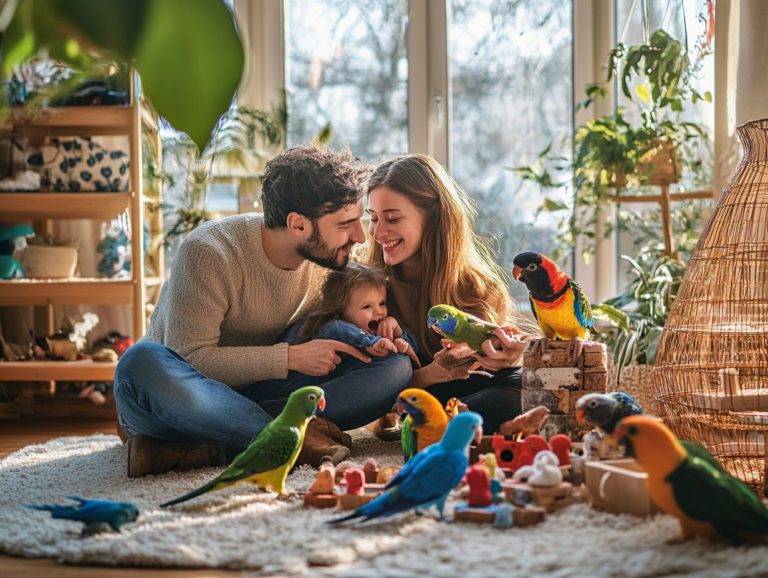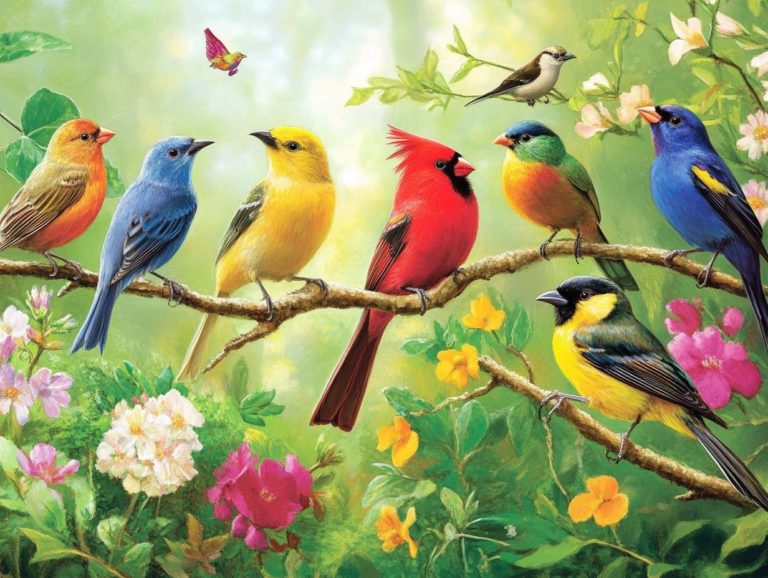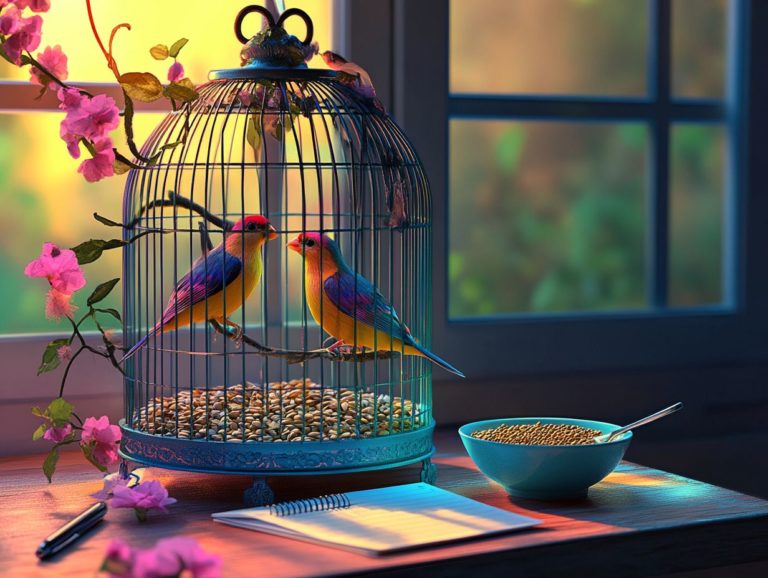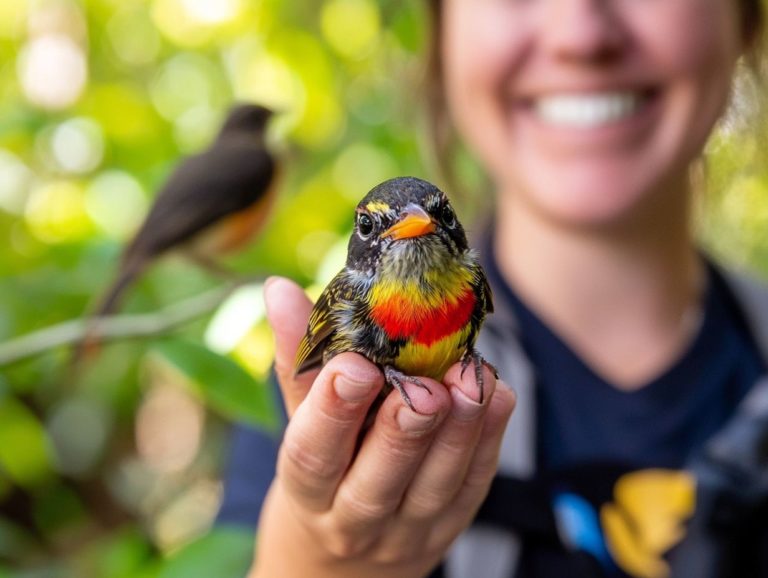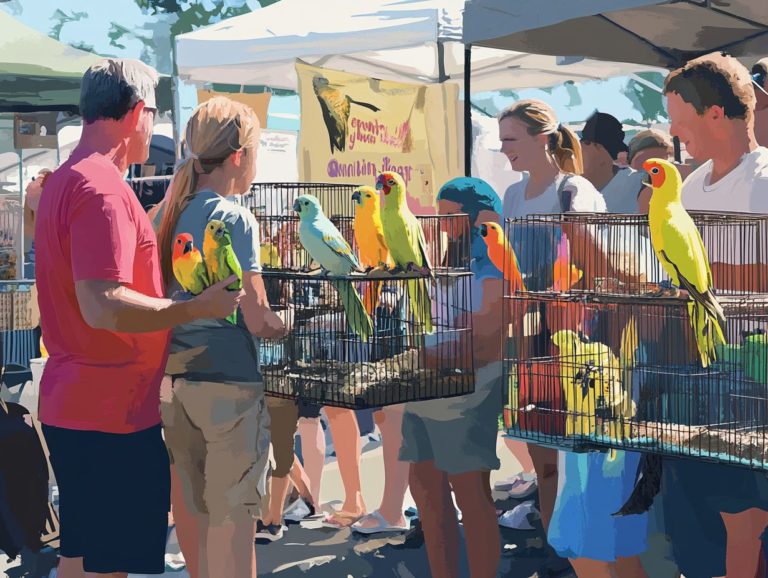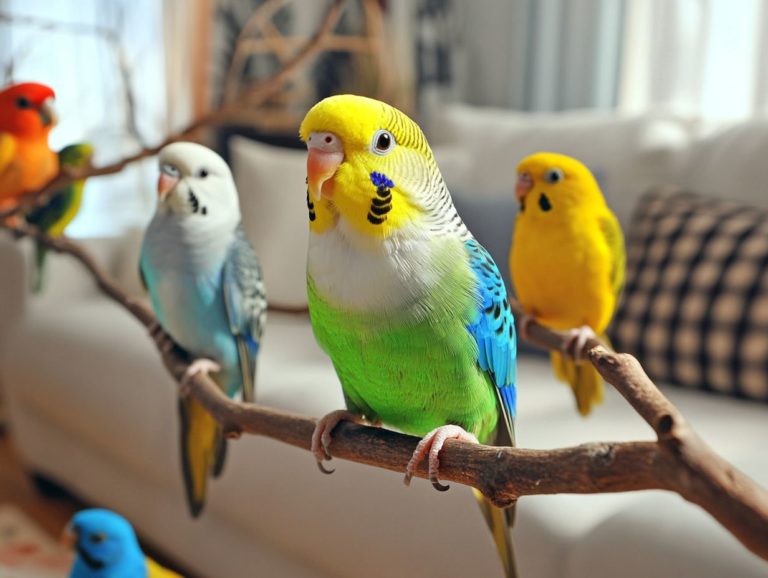The Process of Fostering Birds for Adoption
Join the exciting journey of bird fostering and make a real difference for these amazing creatures! Bird fostering offers a compassionate avenue for you to support avian friends in need while simultaneously enriching your own life.
This article delves into the many benefits of fostering birds. It illuminates how both the birds and you, as a foster, can flourish in this unique partnership. You’ll gain insights into the requirements and training essential for successfully welcoming a bird into your home. Additionally, you’ll discover strategies for navigating the challenges and rewards that come with fostering.
Start your rewarding journey today and help these beautiful birds find their forever homes.
Contents
- Key Takeaways:
- Benefits of Fostering Birds
- Steps to Becoming a Bird Foster
- The Fostering Process
- Challenges and Rewards of Fostering Birds
- Frequently Asked Questions
- What does the process of fostering birds for adoption involve?
- Who can become a foster parent for birds?
- Is there a cost associated with fostering birds for adoption?
- How long does the fostering process typically last?
- What kind of support is available for foster parents?
- Can I adopt the bird I am fostering?
Key Takeaways:

- Bird fostering is a rewarding experience that benefits both the bird and the foster.
- Becoming a bird foster requires meeting certain requirements and undergoing training.
- The fostering process involves introducing the bird to your home and providing proper care and nutrition.
What is Bird Fostering?
Bird fostering is a truly compassionate endeavor. It allows you to temporarily care for birds in need those facing neglect, abandonment, or requiring socialization.
Organizations like Mickaboo and WAES in California work to connect you with various species of companion parrots, from vibrant macaws to charming cockatiels. This ensures that these exotic pets receive essential care, health checks, and training before they find their forever homes. By participating in this initiative, you re not just helping the birds; you re also gaining invaluable experience through your involvement.
The importance of bird fostering goes far beyond simple caregiving. It plays a vital role in rehabilitation helping birds recover and socialization, preparing these intelligent creatures to interact well in a loving, permanent environment. You will encounter various birds, from petite parakeets to complex species like African Greys, each with unique needs and personality.
Organizations dedicated to this cause champion a community-centric approach, encouraging local participation while upholding the highest standards of care. The overarching goal is not just to rescue and rehabilitate these vulnerable birds but also to educate the public about responsible pet ownership and the emotional needs of avian companions. Ultimately, this fosters a more compassionate society.
Benefits of Fostering Birds
Fostering birds offers a wealth of benefits, not just for the birds themselves but also for you as a caregiver. This experience cultivates a deeper connection within the community and enhances the well-being of these charming avian companions.
By creating a safe and nurturing environment, you can profoundly influence the health and behavior of birds in need. This ensures they receive the essential care and socialization required for a joyful life.
Advantages for Both Birds and Fosters
The advantages of fostering birds extend to both you and the birds. This creates a truly enriching relationship that enhances the care and well-being of everyone involved.
By providing stability and attentive nurturing, you help meet the specific needs of these feathered friends. This ensures they thrive both physically and mentally. This supportive environment fosters healthy habits, reduces anxiety, and builds trust elements that are crucial for the birds development while considering their social needs.
In turn, as you embark on this rewarding journey of fostering, you may find yourself enveloped in an abundance of unconditional love. The bonds formed during this nurturing process can significantly uplift your spirits. Engaging in the daily routines of care not only contributes to the birds’ overall health but also deepens your emotional connection, enriching your life in ways that are truly profound.
Ready to make a difference? Reach out to a local bird rescue and start your fostering journey today!
Steps to Becoming a Bird Foster
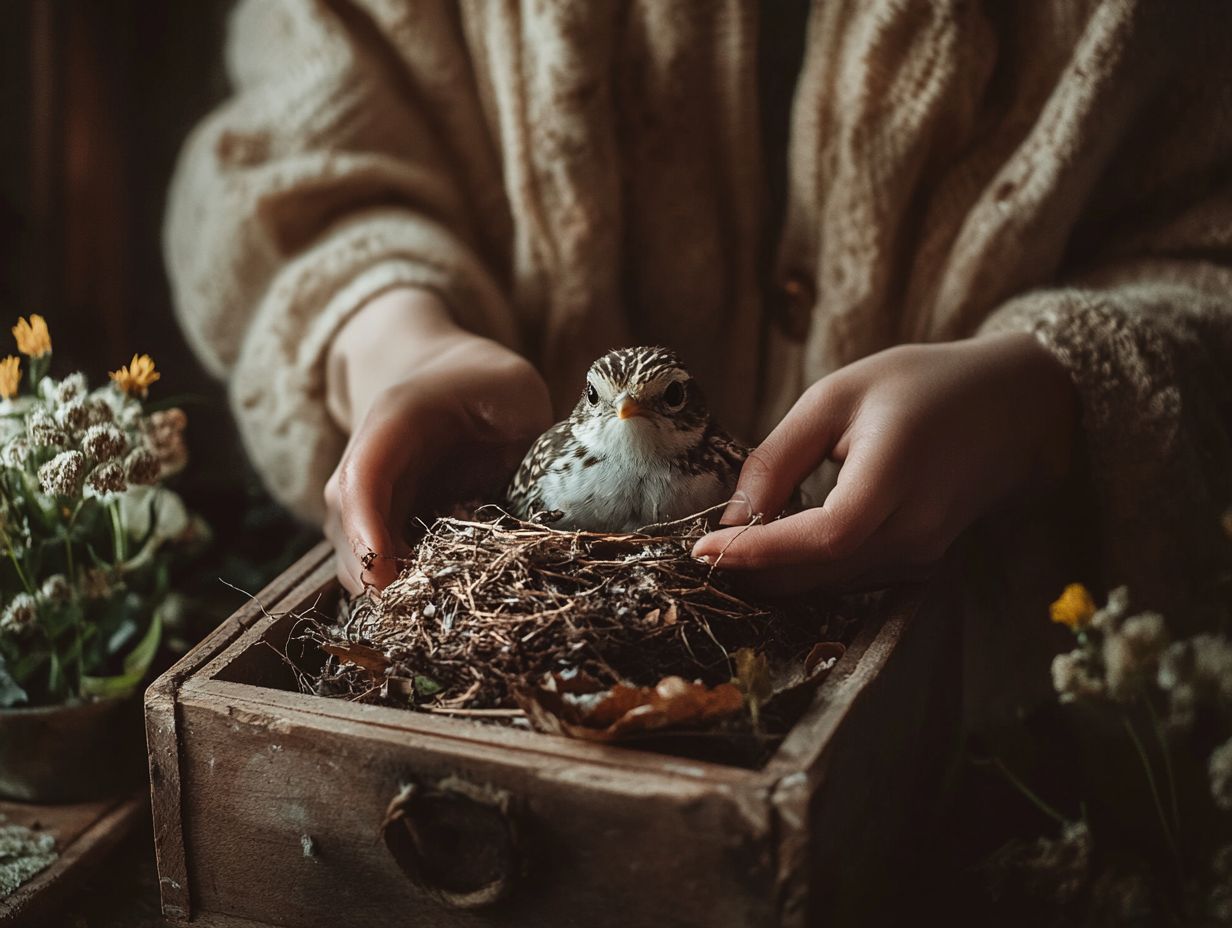
Becoming a bird foster is a rewarding journey that involves several essential steps designed to prepare both you and the birds for a successful fostering journey. If you’re curious about the outcomes, you can learn more about what happens to rescued birds after adoption. It all begins with a comprehensive application process, which often includes:
- Application
- Home visit
- Screening for any potential concerns
- Training courses
These elements are critical in equipping you with the necessary skills to provide exceptional care and support for your birds, including understanding the health and nutrition needs of various species.
Requirements and Training
The requirements and training involved in becoming a bird foster are essential for you to effectively meet the needs of your birds. You’ll often need to complete an application process that outlines your experience with birds, followed by training that covers critical topics such as health, safety, and proper care techniques. This training aims to enhance the overall well-being of the birds.
Understanding health and safety protocols is also important. You should consider your living arrangements adequate space is vital for the comfort and security of these feathered friends. As a foster, you must commit to a specific time schedule, dedicating hours each day to feeding, socializing, and monitoring the birds’ behavior.
Various training courses are available, some focusing on species-specific care while others delve into behavioral management and emergency procedures. By equipping yourself with this knowledge, you can create a comfortable home, reducing the risks of accidents and fostering a trusting relationship with your birds.
The Fostering Process
The fostering process is an exciting adventure that begins the moment a bird finds its way into a temporary home and extends to its eventual adoption. This journey underscores the significance of a comfortable home, as highlighted in understanding bird adoption, which is vital for the bird’s well-being.
Key steps in this process include:
- Home visits to confirm a safe and welcoming setting,
- Continuous communication between you and the fostering organizations,
- An emphasis on tailoring your environment to cater to the unique needs of the bird.
Introducing the Bird to Your Home
Introducing a bird to your home demands careful planning and thoughtful consideration to ensure a seamless transition and a secure environment for your new companion. As a caregiver, it’s essential to create a welcoming space that caters to the bird’s needs while addressing factors like safety, behavior, and socialization. This approach fosters a positive experience for both you and your feathered friend.
Start by assessing your environment. Eliminate hazards such as open windows, toxic plants, and small objects that could be ingested. Creating a safe space is the first step toward a harmonious coexistence.
Act quickly to establish a routine; consistency is crucial in building trust. During initial interactions, maintain a calm and inviting atmosphere, allowing the bird to explore at its own pace.
Keep an eye on your bird’s behavior to learn what it likes and dislikes, enabling you to make necessary adjustments that contribute to a healthier bond. Regularly monitoring your bird’s reactions will guide you in providing an enriched environment that promotes both safety and well-being.
Ready to start your journey as a bird foster? Apply today!
Caring for Foster Birds: A Thrilling Journey

Caring for foster birds is a thrilling journey that demands your attention and love! Proper care and nutrition are essential for their health and longevity. You need to follow practices that keep them healthy, such as selecting appropriate diets and providing safe environments.
Understanding dietary requirements is fundamental. Different species thrive on different nutrition, so a balanced mix of pellets, fresh fruits, and vegetables is key. You should also ensure safe habitats, carefully selecting perches and toys that are free from harmful materials.
Regular health monitoring is vital to address any potential issues promptly. You can enhance their lives by providing mental stimulation through fun activities, like playing with toys or solving puzzles. This not only makes them happier but also encourages natural behaviors.
By paying attention to these factors, you fulfill your responsibilities as a caregiver and foster strong bonds with your avian companions. This ensures they thrive in your care, and you create lasting friendships!
Challenges and Rewards of Fostering Birds
Fostering birds presents a unique blend of challenges and rewards, crafting an enriching experience for you as a caregiver. This journey enhances your life while positively impacting the lives of the birds in your care.
While you may encounter behavioral hurdles or emotional struggles as you develop bonds with your feathered companions, the joy of witnessing their growth and placing them in loving homes far outweighs any difficulties.
Dealing with Behavioral Issues
Dealing with behavioral issues in foster birds will likely be a significant part of your fostering journey. It demands patience, understanding, and effective training techniques. Recognizing common challenges is essential, as is employing strategies that foster positive communication.
From anxiety and aggression to difficulties with socializing, these issues can arise from various factors, including past trauma or insufficient socialization. Establishing consistent routines and utilizing reward-based training rewarding good behavior with treats or praise creates a secure environment for the birds.
Engaging in active communication helps you better understand their needs and builds a trusting relationship crucial for their emotional health. Incorporating tools like clicker training and offering mental stimulation through toys can significantly enhance their adaptability and behavior.
Ultimately, this approach leads to a happier and healthier bird in your fostering setting.
Building a Bond with the Bird
Building a bond with a foster bird is a rewarding journey. It enriches the experience for both you and the bird, nurturing socialization and emotional growth.
Socialization means helping the bird interact with you and others. Emotional growth refers to developing feelings of trust and happiness.
You can cultivate trust through consistent communication, gentle handling, and engaging activities that enhance the bird s well-being while deepening your connection.
Incorporate playtime, interactive toys, and simple training exercises to enhance your relationship. This mutual engagement helps the bird feel secure and provides enriching experiences that stimulate its mind.
By observing the bird s unique preferences and responding to them, you can elevate your interactions into genuine opportunities for companionship with your parrots. Your patience and dedication will greatly impact the bird’s happiness. Create a lasting friendship built on trust and affection!
Frequently Asked Questions
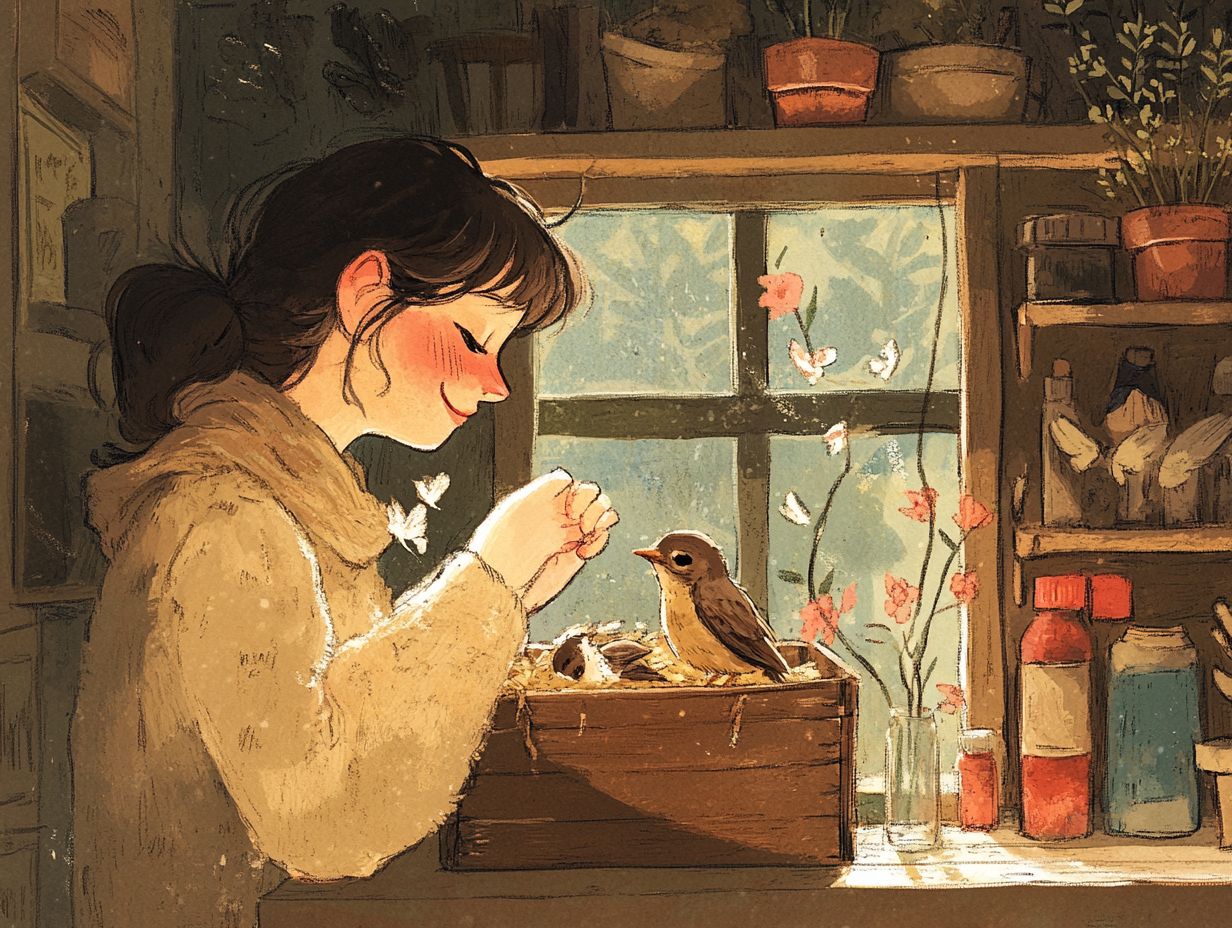
What does the process of fostering birds for adoption involve?
The process of fostering birds for adoption typically involves providing temporary care for a bird until they find a permanent home. This includes feeding the bird, spending time with it, and keeping it safe and comfortable, as well as understanding the lifecycle of adopted birds to ensure their well-being.
Who can become a foster parent for birds?
Anyone who is willing and able to provide proper care for a bird can become a foster parent. This may include individuals, families, or even rescue organizations.
Is there a cost associated with fostering birds for adoption?
In most cases, the cost of caring for the bird will be covered by the organization or individual responsible for the adoption. However, foster parents may choose to provide supplies or make donations to help cover expenses.
How long does the fostering process typically last?
The length of the fostering process can vary depending on the individual bird and the availability of potential adopters. For those considering bringing a feathered friend into their home, it’s important to understand what you should know about bird adoption. Some birds may find a permanent home quickly, while others may take longer.
What kind of support is available for foster parents?
Many organizations that facilitate bird adoptions provide support for foster parents. This includes training, supplies, and advice, as well as resources on understanding the behavior of adopted birds. Foster parents can also connect with experienced peers for guidance and encouragement.
Can I adopt the bird I am fostering?
Yes! Foster parents can adopt the bird they are caring for. The organization’s policies will determine this decision.

